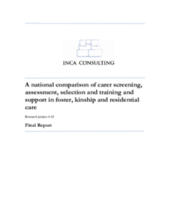EXECUTIVE SUMMARY
Introduction and objectives
In June 2015, the Australian Royal Commission into Institutional Responses to Child Sexual Abuse conducted public hearings in relation to out‑of‑home care (OOHC) and allegations of child sexual abuse occurring in OOHC settings (Case Study 24). In December 2015, the Royal Commission commissioned national research to answer the following questions:
- What policies and processes does each state or territory government have in place for carer screening, assessment, selection, training and support to prevent or respond effectively to child sexual abuse in foster care, kinship care and residential care settings?
- What policies and processes do non-government (NGO) providers of OOHC services have in place for carer screening, assessment, selection, training and support to prevent or respond effectively to child sexual abuse in foster care, kinship care and residential care settings?
- What are the factors that help facilitate the implementation of these policies and processes to prevent or respond effectively to child sexual abuse in foster care, kinship care and residential care settings?
- What are the barriers to the implementation of these policies and processes to prevent or respond effectively to child sexual abuse in foster care, kinship care and residential care settings?
Methodology
The research entailed:
- a review of documentation including, but not limited to, submissions to the Royal Commission in response to the questions asked under Case Study 24
- interviews and small group discussions with representatives of relevant state and territory government agencies
- interviews and small group discussions with representatives of non-government providers of OOHC services
- interviews and small group discussions with representatives of relevant peak organisations, training organisations and researchers.
Summary of findings
The research highlighted the variability across jurisdictions in terms of some key contextual factors:
- the mix and balance of government and NGO service provision across the various care types the range and mix of care models, including semi-professionalised or paid carer models, different therapeutic care models, and wraparound care arrangements
- the degree to which there are legislated or stipulated requirements for the tools and frameworks for assessing carers and the training provided to carers
- the arrangements for monitoring, oversight and accountability in relation to OOHC service provision and adherence to standards relating to carer assessment, training and support
- the challenges of providing training and support to a dispersed carer population, including many in rural and remote areas
- the status of current reforms and practice improvements relating to the protection of children and young people in care.

